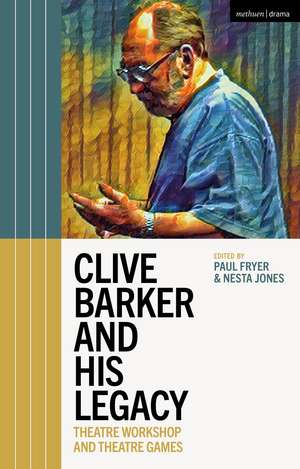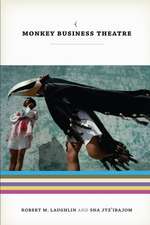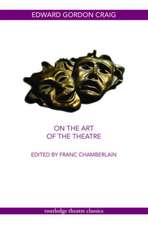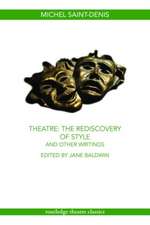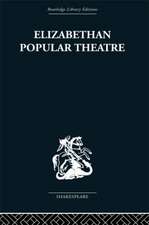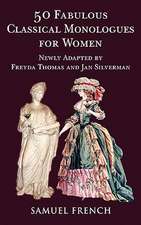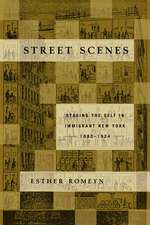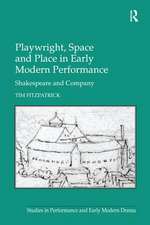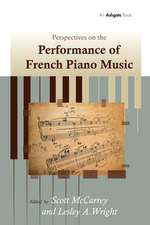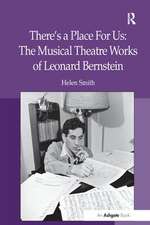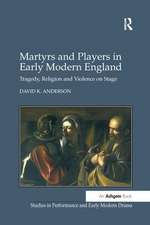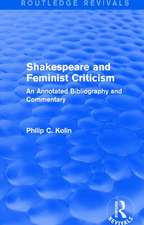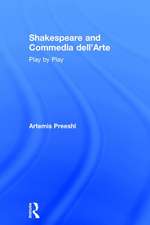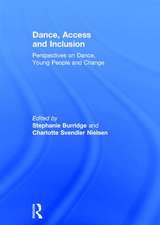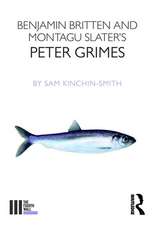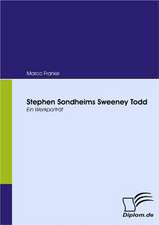Clive Barker and His Legacy: Theatre Workshop and Theatre Games
Dr Paul Fryer, Dr Nesta Jonesen Limba Engleză Paperback – 20 sep 2023
Toate formatele și edițiile
| Toate formatele și edițiile | Preț | Express |
|---|---|---|
| Paperback (1) | 190.16 lei 43-57 zile | |
| Bloomsbury Publishing – 20 sep 2023 | 190.16 lei 43-57 zile | |
| Hardback (1) | 496.46 lei 43-57 zile | |
| Bloomsbury Publishing – 9 mar 2022 | 496.46 lei 43-57 zile |
Preț: 190.16 lei
Preț vechi: 248.72 lei
-24% Nou
Puncte Express: 285
Preț estimativ în valută:
36.39€ • 38.09$ • 30.11£
36.39€ • 38.09$ • 30.11£
Carte tipărită la comandă
Livrare economică 07-21 aprilie
Preluare comenzi: 021 569.72.76
Specificații
ISBN-13: 9781350296169
ISBN-10: 1350296163
Pagini: 240
Ilustrații: 8 bw illus
Dimensiuni: 138 x 216 mm
Greutate: 0.28 kg
Editura: Bloomsbury Publishing
Colecția Methuen Drama
Locul publicării:London, United Kingdom
ISBN-10: 1350296163
Pagini: 240
Ilustrații: 8 bw illus
Dimensiuni: 138 x 216 mm
Greutate: 0.28 kg
Editura: Bloomsbury Publishing
Colecția Methuen Drama
Locul publicării:London, United Kingdom
Caracteristici
All of the contributors have had a personal relationship with Clive Barker, either as a collaborator in the theatre, a professional colleague in training or academia, or as a student of his work.
Notă biografică
Nesta Jones recently retired as a Professor and Director of Research at Rose Bruford College of Theatre and Performance. She is on the Editorial Board of Stanislavski Studies (Taylor & Francis) and a Contributing Editor for New Theatre Quarterly (Cambridge University Press) for both of which she has also written articles; and is a Fellow of the Higher Education Academy and a Fellow of the Royal Society of Arts. Paul Fryer recently retired as Head of Research Degrees and Director of The Stanislavski Centre at Rose Bruford College of Theatre and Performance (UK). He was awarded a Professorship of the College in Summer 2015. He now holds Visiting Professor posts at Leeds and London South Bank Universities. Paul is editor-in-chief of the journal Stanislavski Studies, published by Routledge/Taylor and Francis, and co-convenor of the international research project The S Word, which explores the influence of Stanislavski on contemporary theatre. Clive Barker was born in Middlesbrough in 1931. Having trained in stage management at the Bristol Old Vic School, he joined Joan Littlewood's Theatre Workshop in 1955. Among the plays he directed were the Royal Court production of Shelagh Delaney's Lion in Love, the British premiere of Slavomir Mrozek's The Police and Marlowe's Dr Faustus for the German National Theatre in Weimar. He directed in Germany, the US and in Colombia, where he was Associate Director of the Teatro Libre de Bogota. From 1966-1974 he was Lecturer in the Department of Drama and Theatre Arts at Birmingham University and after a short period as director of the Northcott Theatre in Exeter he was Senior Lecturer in Theatre Studies at the University of Warwick until his retirement in 1996. He had a major stroke in 2002 which limited his ability to continue working, but when he died of another stroke on 17 March 2005, it was in the foyer of York Theatre Royal after leading a workshop with The Shysters.
Cuprins
Notes on contributorsAcknowledgements1 Introduction: Clive's Legacy - Nesta Jones and Paul Fryer2 Clive Barker: A Biographical Memory - Simon Trussler3 Clive Barker: My Einstein - Murray Melvin4 Clive Barker and Alternative Theatre - Susan Croft5 Clive Barker, Tribal Scribe - Nadine Holdsworth6 'A New Team': Clive Barker and Shelagh Delaney's The Lion in Love - Aleks Sierz7 Theatre Gains: Remembering Clive - Ceri Pitches8 Clive Barker and Movement - Dick McCaw9 On Supplanting Oligarchy: Clive Barker's Defiant Anti-Authoritarianism - Chris Baldwin10 Hacking the Archives: the 2012 Olympic Legacy, Fun Palaces and Game Theatre - Joseph Dunne-Howrie11 An Evening with Clive Barker: an Edited Transcript of a Unique Event - edited by Paul Fryer12 Nine Lives and Counting - Chrissie PoulterAppendix I: Authorial bibliography and professional credits compiled by Nesta JonesAppendix II: Teaching and training compiled by Nesta JonesIndex
Recenzii
Fryer and Jones do a wonderful job of introducing Barker's legacy, and of following the wanderings of a man who worked in so many areas of theatre . The book is engrossing, accessible, and has something in it for practitioners, academics, and anyone else interested in the formation of the alternative theatre scenes in the 1960s and 1970s. Clive Barker's legacy is a strong one indeed.
Clive Barker ... made an exceptional contribution to British theatre studies and its international standing. No one else of his generation travelled the extraordinary distance from a conventional stage management course to become a world leader in actor training workshops, as well as an editor and scholar of distinction. He was a pioneer in bridging the uneasy divide between professional theatre and its serious study in British universities ... His book, Theatre Games (1977), was enormously influential for theatre practitioners and teachers in many countries. Its freshness of thought and imaginative instruction was presented in a highly accessible form, astutely combining practical advice, a digest of games, and stimulating theories. The success of Theatre Games was built on the best of radical foundations ... For almost two decades following Theatre Games, [Barker] worked on the international theatre workshop circuit, at the highest levels. Participants in these workshops, numbering many thousands, were treated to a method that was brilliantly inventive in its lack of presumption and ever-present humour. In this, Barker had the touch of an outstanding creative innovator.
A massive contribution to the art of theatre ... Dazzlingly astute and a thrilling read.
Clive Barker ... made an exceptional contribution to British theatre studies and its international standing. No one else of his generation travelled the extraordinary distance from a conventional stage management course to become a world leader in actor training workshops, as well as an editor and scholar of distinction. He was a pioneer in bridging the uneasy divide between professional theatre and its serious study in British universities ... His book, Theatre Games (1977), was enormously influential for theatre practitioners and teachers in many countries. Its freshness of thought and imaginative instruction was presented in a highly accessible form, astutely combining practical advice, a digest of games, and stimulating theories. The success of Theatre Games was built on the best of radical foundations ... For almost two decades following Theatre Games, [Barker] worked on the international theatre workshop circuit, at the highest levels. Participants in these workshops, numbering many thousands, were treated to a method that was brilliantly inventive in its lack of presumption and ever-present humour. In this, Barker had the touch of an outstanding creative innovator.
A massive contribution to the art of theatre ... Dazzlingly astute and a thrilling read.
